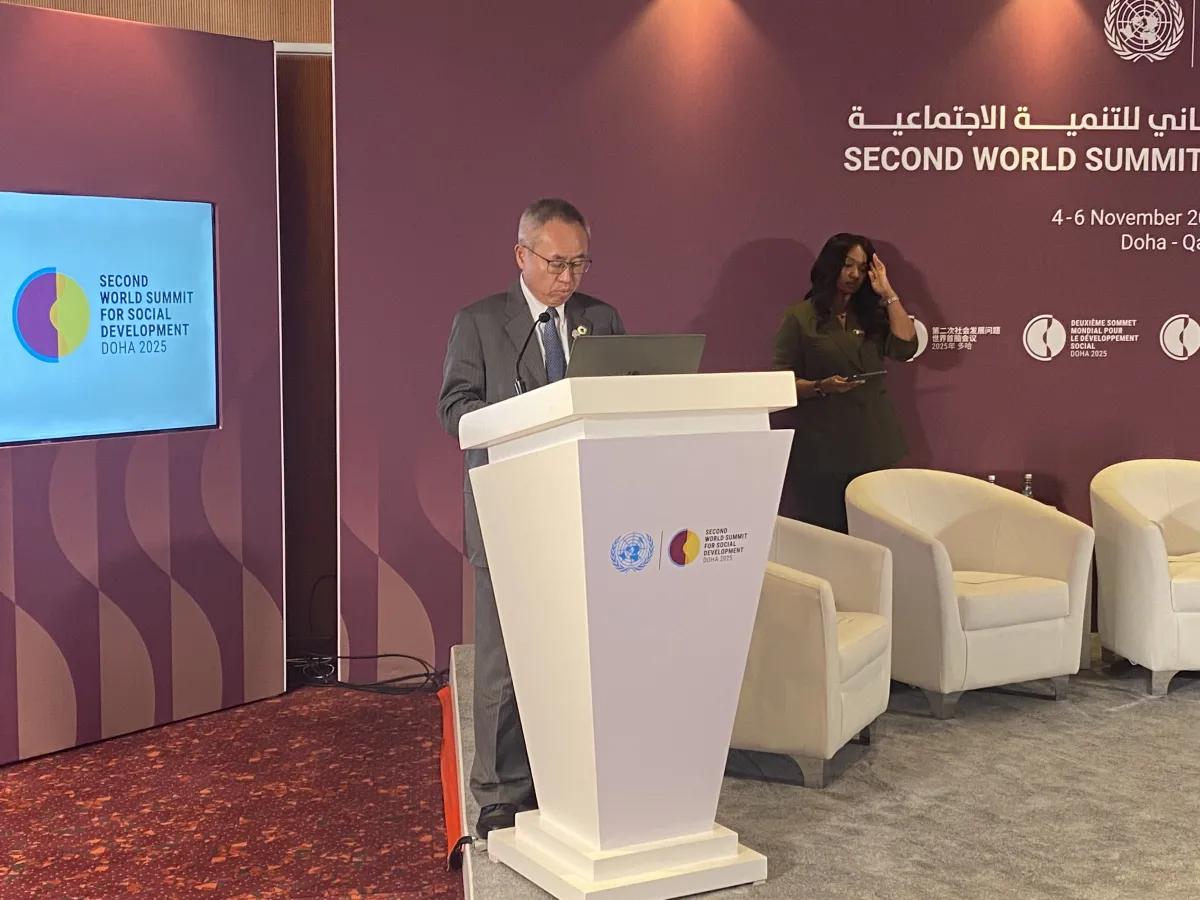Policy Meets the Pitch: Integrating Sport into Social Inclusion Agendas
At the World Summit for Social Development in Doha, a Solution Session titled Policy Meets the Pitch: Integrating Sport into Social Inclusion Agendas highlighted how sport can advance social inclusion and sustainable development. The session, held on 6 November 2025 at the Qatar National Convention Center, brought together athletes, diplomats, policymakers, and community practitioners to discuss practical strategies for leveraging sport as a tool for equality, education, and community engagement.
Co-organized by the Department of Economic and Social Affairs at the United Nations, the Permanent Missions of Monaco and Qatar, UN Women, the Department of Global Communications, the International Olympic Committee (IOC), and Peace and Sport, the session showcased how diverse partners can come together to unlock sport’s social impact. Moderated by Al Jazeera Sports Presenter Samantha Johnson, the discussion explored how sport can bridge inequalities and strengthen communities.
Setting the Stage
Opening speakers highlighted sport’s growing role in shaping society. H.E. Isabelle Picco and H.E. Alya Ahmed bin Saif Al-Thani, the Permanent Representative of Monaco and the Permanent Representative of Qatar to the United Nations, spoke about sport’s integration into national and international development strategies. As an example, H.E. Al-Thani highlighted Qatar’s Ability Friendly initiative which gives ‘children and adults with disabilities the opportunity to engage fully in sport’. Similarly, UN Under-Secretary-General Li Junhua emphasized the importance of policy, partnerships, and evidence-based approaches to create lasting impact. USG Junhua reiterated the UN’s and Member States’ commitment to operationalizing the sport agenda, as evidenced by the adoption of the Doha Declaration, which calls for the integration of culture and sport into development strategies. He urged everyone to ensure that every person ‘regardless of gender, ability, or background’ can access and participate in sport. IOC President, Kirsty Coventry, delivered a video message, highlighting the power of sport, as hundreds of IOC initiatives take place across more than 180 countries, delivering meaningful impact in ‘peace, education, health, gender equality and youth development’.
Challenges were also acknowledged. Sima Bahous, Executive Director of UN Women spoke on barriers facing women and girls Women and girls in sport continue to face violence and harassment, unequal pay, lack of access to facilities, and limited representation in decision-making roles. These challenges are not confined to the sports arena; they mirror wider social inequalities. Joël Bouzou, President and Founder of Peace and Sport, stressed the need to bridge gaps between policymakers and grassroots actors, stressing the power of sports in providing equity, building self-esteem, and fostering mutual dialogue and inclusion.

Panelists and Perspectives
Panelists took the stage to deep dive into their perspectives as athletes and policymakers on the ground.
Michael Cacich of Education Above All (EAA) highlighted sport’s role in education, noting that 30–70 of EAA projects incorporate sport to improve attendance, retention, and self-esteem among children. He stressed that there are globally ‘78 million children at the primary level that should be in school but are not’. Similarly, Katia Mascagni of the IOC underlined that inclusive sport systems rely on partnerships and investing in the people who deliver programs – coaches, educators, and community organizers – to sustain long-term impact.
Athletes brought these ideas to life. Mikaël Silvestre, former footballer from Manchester United and the French national team, described establishing sport initiatives for youth in Africa; Mutaz Barshim, Olympic gold medalist, high-jump world champion and Champion for Peace, shared his What Gravity Challenge to expand access for marginalized communities, and emphasized how important his voice is as an athlete and ‘how to use it right’; and Tegla Loroupe, former Kenyan long-distance runner and President and Founder of Tegla Loroupe Peace Foundation, highlighted her foundation’s school for girls, which has supported over 7,000 children.
Fatma Al-Nuaimi of Qatar’s Supreme Committee closed the session by underscoring the country’s commitment to sport as a tool for leadership, teamwork, and gender equality through programs like Generation Amazing.

Sport as a Tool for Social Development
Throughout the discussion, participants emphasized that sport is a practical, inclusive, and scalable tool to advance equality, education, health, and opportunity. Aligned with the Copenhagen Declaration, the Doha Declaration, and the 2030 Agenda for Sustainable Development, the session reinforced a simple but powerful message: sport can bring communities together and help build a world where no one is left behind – on or off the pitch.
Solution Session on UN WebTV: https://webtv.un.org/en/asset/k11/k11wwqr8ff
Interviews with athletes:
 Welcome to the United Nations
Welcome to the United Nations